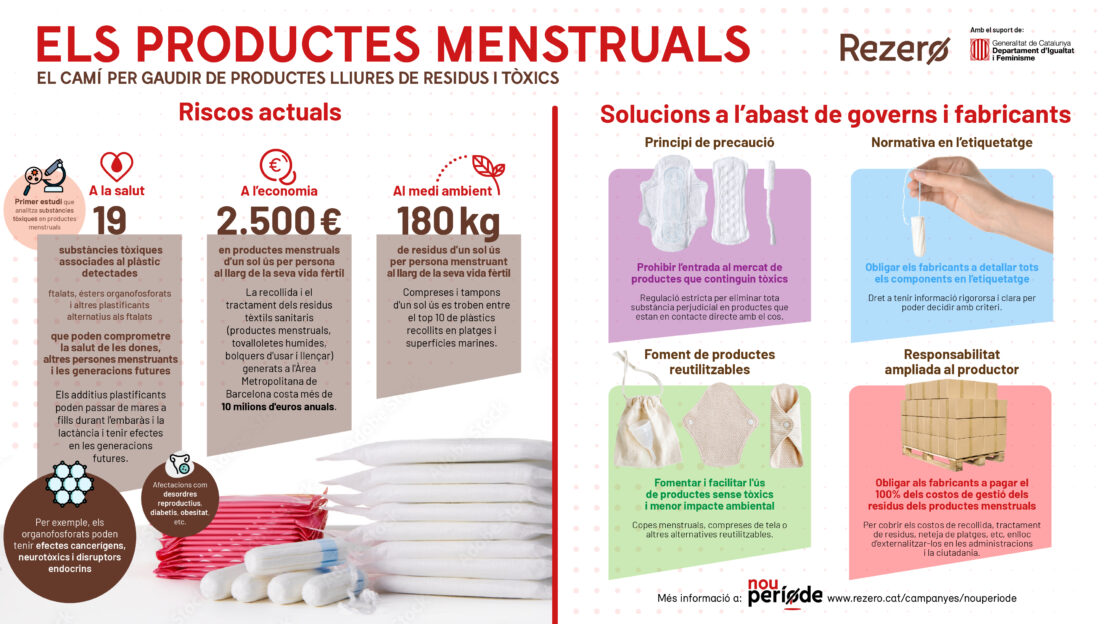Barcelona, November 28, 2024 – A project carried out by Rezero with the collaboration of the Institute of Environmental Diagnostics and Water Studies (IDAEA-CSIC), has revealed the presence of substances that can compromise health human in disposable menstrual products. This pioneering research, carried out for the first time in Spain, analyzed ten samples of pads and tampons from various brands on the national market, finding 19 plasticizers out of a total of 36 investigated substances.
This study, which is supported by the Department of Equality and Feminism of the Generalitat de Catalunya, is part of the project “Scientific research and dissemination of menstrual products to promote women’s health”. The initial results show that plasticizers have been identified in all the samples analyzed. Specifically, they found:
– Phthalates (PAEs) 4 of the 9 substances analyzed
– Organophosphorus esters (OPEs) 9 of the 17 substances analyzed
– Alternative plasticizers to phthalates (NPPs) 6 of the 10 substances analyzed
Many of these substances, for example, organophosphorus esters can have carcinogenic, neurotoxic and endocrine disrupting effects, associated with risks such as reproductive disorders, diabetes and obesity.
Infographic (in catalan)

Towards greater protection of the health of women and other menstruating persons
Rezero insists that, given the presence of these substances in products that are in direct contact with the body and, especially, with areas as sensitive as the genitals, it is essential to apply the Precautionary Principle. This means that the marketing of products with substances potentially harmful to health should be prevented until their safety is proven. The IDAEA-CSIC plans to continue with research to determine the degree of absorption and the real impact of these plasticizers on the body, although, for now and as a precaution, the results already reinforce the need for a strict regulation that avoids the presence of toxic substances in these products.
Responsibility and transparency in the menstrual products market: a call to action for political leaders
Menstrual products are part of the daily life of millions of people, but often their composition includes toxic substances and generate large amounts of waste that end up having high economic and environmental costs. Rezero calls on policy makers and public administrations to establish regulations and practices that ensure safer menstrual products that respect health and the environment. For this reason, we urge the leaders to take concrete actions to protect the right of consumers to a consumption free of toxins and waste. The proposals are the following:
1. Prohibit the presence of toxic substances in menstrual products: It is crucial to establish strict regulation to eliminate all harmful substances in products that are in direct contact with the body. This would ensure the safety and health of people who use them on a recurring basis.
2. Oblige manufacturers to detail all the components in the labelling: Transparency in the composition of products would allow consumers to make informed and free decisions. Rigorous and clear information should be a legal obligation, not an option.
3. Facilitate access to reusable and toxic-free menstrual products, which are more environmentally friendly: Promoting and facilitating the use of non-toxic products with less environmental impact (such as menstrual cups, cloth pads or other reusable alternatives) is essential to move towards a more sustainable and healthy consumption model.
4. Waste management costs covered by manufacturers. Force manufacturers to pay 100% of menstrual product waste management costs. To cover the costs of collection, waste treatment, beach cleaning, etc., instead of outsourcing them to the administrations and citizens.
Implementing these measures not only improves the health and well-being of menstruating people but can also have a positive economic impact on waste management. This is evident in the case of the Barcelona Metropolitan Area, where the collection and treatment of the sanitary textile waste generated (menstrual products, wet wipes, disposable diapers) costs more than 10 million euros per year. Opting for reusable and toxic-free products would not only lighten this economic burden but would also contribute to a fairer consumption model that respects people and the planet.
Promotion of menstrual information and education
One of the outstanding lines of action of this study is the empowerment of menstruating people through proven and accessible information. It is essential to provide proper menstrual education that breaks down taboos and allows people to make informed decisions about the products they use. The program New Period of Rezero is committed to continuing to normalize menstruation and promoting the use of non-toxic, reusable alternatives.
Towards a zero-waste society: a toxic-free future
This study is part of the Future Without Toxic Declaration that already has more than 100 signatures of medical and scientific professionals and makes it clear that consumer products should not contain toxic substances, especially those of direct contact such as products menstrual pads, diapers, plastic containers, among others. To achieve this goal, Rezero also emphasizes the importance of collaborating with other work networks and organizations to socialize information and influence public policies.
With this initiative, Rezero wants to promote a transition towards safe, sustainable and toxic-free menstrual products, offering transparent information and asking companies to prioritize people’s health and well-being above commercial profits.
Reference information:
Program New Period https://www.rezero.cat/en/campanyes/new-period/
Retrieve the public presentation of the project (in catalan): https://www.youtube.com/watch?v=Qv48_DgpK0Y&t=1s